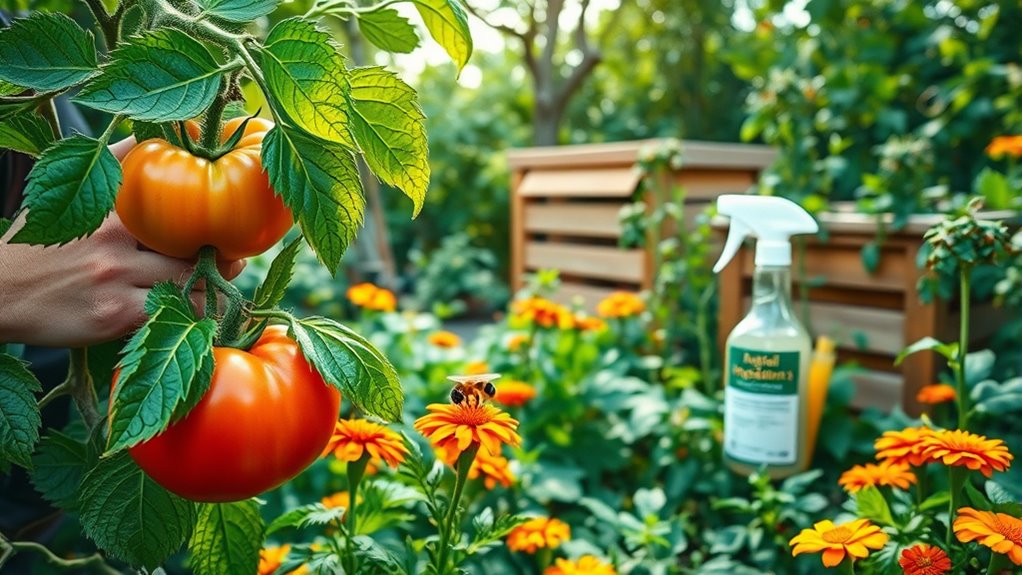To control pests organically, start by attracting beneficial insects like ladybugs and lacewings using nectar-rich flowers, which naturally reduce pest populations. Use homemade remedies such as garlic, hot pepper, and soap sprays to deter aphids and mites. Neem oil is also effective in disrupting pests’ lifecycle without harming your plants. Regular monitoring, maintaining healthy soil through watering and crop rotation, and avoiding chemical pesticides help keep your garden balanced. Discover more simple, eco-friendly techniques that really work.
Key Takeaways
- Attract beneficial insects like ladybugs and lacewings by planting nectar-rich flowers to naturally control pests.
- Use homemade sprays with garlic, hot peppers, and soap to deter aphids, mites, and caterpillars effectively.
- Apply neem oil as a natural pesticide to disrupt pest feeding and reproduction cycles safely.
- Maintain a healthy garden through proper watering, crop rotation, and monitoring to reduce pest susceptibility organically.
- Avoid chemicals and support ecological balance by combining natural remedies with habitat management strategies.

Organic pest control methods offer a safe and effective way to protect your garden without relying on harmful chemicals. One of the most natural strategies involves encouraging beneficial insects to do the work for you. These helpful creatures, like ladybugs, lacewings, and predatory beetles, feast on common pests such as aphids, mites, and caterpillars. By creating a welcoming environment—planting nectar-rich flowers, avoiding broad-spectrum pesticides, and providing shelter—you can attract and sustain these beneficial insects. They’ll naturally keep pest populations in check, reducing the need for chemical interventions. This approach not only protects your plants but also maintains the ecological balance in your garden.
Alongside encouraging beneficial insects, homemade remedies can serve as potent tools in your organic pest control arsenal. Many pests dislike certain natural substances, and applying these can prevent infestations or reduce existing ones. For example, a simple spray made from garlic, hot peppers, and soap can deter aphids and spider mites. To make it, blend garlic and hot peppers with water, let it sit overnight, strain the mixture, and add a few drops of dish soap before spraying on affected plants. This homemade remedy is non-toxic, inexpensive, and easy to prepare, making it an excellent choice for maintaining organic practices. Similarly, neem oil, derived from the neem tree, acts as a natural pesticide that disrupts pest feeding and reproduction. Mixing neem oil with water and a small amount of soap creates a versatile spray that you can apply to a broad range of plants.
It’s important to remember that organic pest control isn’t about eliminating pests entirely but managing them effectively. Regular monitoring helps you identify problems early before they become severe. When you spot pests, applying homemade remedies or attracting beneficial insects can often solve the issue without resorting to chemical pesticides. Keep in mind that a healthy garden is less susceptible to pests, so proper watering, fertilizing, and crop rotation contribute to pest resistance. Incorporating dog names can sometimes help in creating a balanced environment, as some pet-related activities can influence garden health. Combining these practices—encouraging beneficial insects and using homemade remedies—gives you a powerful, eco-friendly approach that’s safe for your family, pets, and the environment. With patience and consistency, you’ll find that organic pest control methods are not only effective but also rewarding as you foster a thriving, balanced garden.
Frequently Asked Questions
Are Organic Pest Control Methods Safe for Pets and Children?
You want to know if organic pest control methods are safe for pets and children. Generally, they’re designed to be safer than chemical options, prioritizing pet safety and child protection. However, it’s still important to read labels carefully and follow instructions, as some natural ingredients can cause irritation or allergic reactions. Always keep pets and kids away during application, and store products securely to guarantee their safety.
How Long Does It Take to See Results Using Organic Methods?
When you ask about how long it takes to see results using organic methods, you’re looking at timing expectations and effectiveness timeline. Typically, you might notice initial improvements within a few days to a week, but full results often take two to three weeks, depending on the pest and method used. Consistency is key, so stick with your plan, and you’ll likely see a gradual decline in pests over time.
Can Organic Pest Control Methods Be Used Indoors Effectively?
Sure, you can totally use organic pest control indoors—because who needs harsh chemicals around their precious indoor plants and family, right? Just imagine your home environment adjustments like introducing neem oil or diatomaceous earth to keep pests at bay. These methods effectively protect your indoor plants and maintain a healthy home atmosphere, all while avoiding toxic fumes. So go ahead, embrace organic solutions for indoor plant protection with confidence!
Are Organic Options Cost-Effective Compared to Chemical Pesticides?
When comparing organic options to chemical pesticides, you’ll find that organic methods often cost less or are similarly priced, making them a smart choice for budget planning. The cost comparison shows that organic pest control can save you money over time, especially since it reduces health risks and environmental impact. Plus, choosing organic methods aligns with sustainable living goals while effectively managing pests without breaking your budget.
Do Organic Pest Control Methods Work on All Types of Pests?
You might wonder if organic pest control methods work on all pests. The truth is, their effectiveness varies because of pest specificity. While organic options can target many common pests effectively, some stubborn or highly resistant pests may require integrated approaches. You should assess your pest problem carefully, choose the right organic method, and be patient, as results can differ depending on the pest type and infestation severity.
Conclusion
Think of your garden as a thriving kingdom, where healthy plants stand tall like vigilant guards. Just as a wise ruler employs loyal allies to fend off invaders, your organic pest control methods act as your trusted army, keeping pests at bay naturally. With patience and care, you’ll nurture a vibrant, balanced landscape—an oasis where beneficial creatures flourish and pests retreat. Embrace these methods, and watch your garden become a resilient, flourishing haven.









